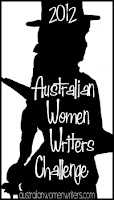
Kate Grenville is one of Australia's best known authors with eight novels and four books about writing to her name. Having greatly enjoyed The Idea of Perfection (2000) a winner of the Orange Prize, I decided to read The Secret River (2005) as my second review in the Australian Women Writers Challenge.
The Secret River was awarded the Commonwealth Prize for Literature and the Christina Stead Prize, was shortlisted for the Man Booker Prize and Miles Franklin Award, and has now been translated into many languages.
There are obvious difficulties in approaching an award winning novel. The press of preconceived notions hang in one's head. What can be said that hasn't already been spouted elsewhere? So I approached with a head as clear as was practical.
The journey of William and Sal Thornhill from London to a convict's life in Sydneytown, and then as settlers along the Hawkesbury River, is a compelling one. Anyone familiar with Australian history knows there is unlikely to be a happy ending, and the tragedy at the climax dispels all hope of one, least of all the capacity of the characters for self-reflection.
About a year ago I was responsible for teaching a Grade 3 unit 'European Settlement' in a local primary school. The children were asked to find out about how their family came to Australia. One young lad piped up saying, My family didn't come from anywhere else, just Australia. I explained that unless his family were of aboriginal descent his family had in fact come from another land. He looked at me dubiously. Nah, not mine. My family came from Mildura. The next morning he burst throughout the door saying, Guess what Ms Graham, my family came to Australia by boat!
 Well, that's a story about a child's discovery, you say. True enough. But I heard recently of a well educated woman in her 60s who could scarcely believe aboriginal people had ever lived on the Bellarine Peninsula (Victoria, Australia), despite what she had learnt about William Buckley, an escaped convict who lived for decades with aboriginal people. History lessons do not always translate into living-breathing knowledge.
Well, that's a story about a child's discovery, you say. True enough. But I heard recently of a well educated woman in her 60s who could scarcely believe aboriginal people had ever lived on the Bellarine Peninsula (Victoria, Australia), despite what she had learnt about William Buckley, an escaped convict who lived for decades with aboriginal people. History lessons do not always translate into living-breathing knowledge.
The story of Australian settlement is one, I believe, the adult community is yet to come to terms with. It is confronting to recognise that if your ancestors were landholders, farmers or squatters, chances are they had direct conflict with aborigines. Far easier to lump those attitudes in history books than imagine your own flesh-and-blood slaughtering, poisoning, driving away, or stealing children. The Secret River dives headlong into this reality, and it is disturbing.
The writing is deliciously pictorial. This from the opening pages describes William's first night in Sydney Cove:
The air moved around him, full of rich dank smells. Trees stood tall over him. A breeze shivered through the leaves, then died, and left only the vast fact of the forest.
He was nothing more than a flea on the side of some enormous quiet creature.
Down the hill the settlement was hidden by the darkness. A dog barked in a tired way and stopped. From the bay where the Alexander was anchored there was a sense of restless water shifting in its bed of land and swelling up against the shore.
....
Now, standing in the great sighing lung of this other place and feeling the dirt chill under his feet, he knew that life was gone. He might as well have swung at the end of the rope they had measured for him. This was a place, like death, from which men did not return. It was a sharp stab like a splinter under a nail: the pain of loss. He would die here under these alien stars, his bones rot in this cold earth.
The narrative immediately drew me into its story as Will's thoughts, through whom we view events, are related via colloquial grammar:
He had frightened her talking about the land too sudden, not working out how it might all be done. He had to go slower, that was all.
 |
Kate Grenville
|
Some months have passed since I completed the reading. I avoided public reflection until I'd had time to analyse my reactions to The Secret River. This is because I found its ending unsatisfactory. Even now, I find it difficult to articulate why. Perhaps I expected remorse, rather than resignation from the characters I'd grown to know. I certainly wanted justice, but that would have flown in the face of history. The Secret River felt unsatisfying, not because of the writing, but because I wished history had been altogether different.
For this reason I am keen to read Grenville's new novel Sarah Thornhill (2011), a sequel to The Secret River. According to Grenville's website 'it's a story about what happens when you uncover dark secrets from the past, and is told through the voice of the youngest daughter of William Thornhill of The Secret River'.
Further, now that The Idea of Perfection and The Secret River are in pre-production ahead of film release, it is clear the journey of these two stories are far from complete. I only hope my mind's images born from reading both novels will be at least equalled on the big screen.
"The Secret River felt unsatisfying, not because of the writing, but because I wished history had been altogether different." - well put, Lucy. A thoughtful review.
ReplyDeleteThankyou Annabel.
ReplyDelete